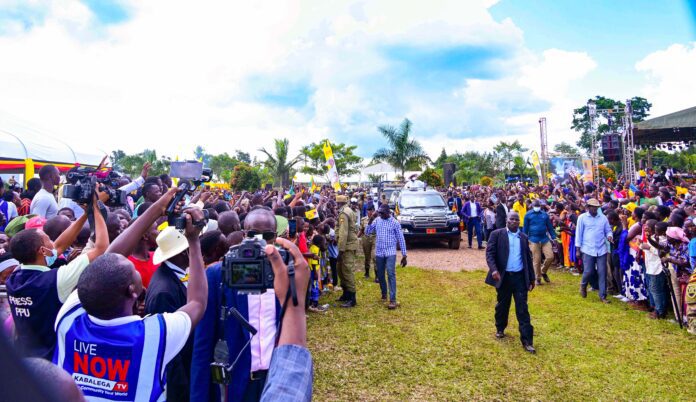
President Yoweri Kaguta Museveni has urged leaders across Uganda to conduct honest and practical assessments of household financial capacities in their communities to help guide the future of the country’s free education policy.
Speaking at a thanksgiving ceremony for Hon Grace Mary Mugasa, Minister of State for Public Service, in Kikuube District, the President challenged political, religious, and cultural leaders to critically evaluate whether families in their areas can truly afford to pay school fees.
“I pose this question to you, the leaders: can the people in your villages truly afford to pay school fees?” President Museveni asked. “If they cannot, then the NRM was right to introduce free education. But if circumstances have changed and they are now able to pay, then it may be time to reconsider the policy.”
The president emphasized that the original intent behind universal primary and secondary education was to help children from poor families access school. He asked leaders to distinguish between families genuinely struggling with poverty and those who simply choose not to pay school fees, despite being able to.
Citing a real-life example, he referred to a woman named Deziranta, whom he described as having no income. “Can someone like Deziranta afford school fees? We need to be honest about the realities in our communities,” he said while addressing a rally in Ibanda.
The president also raised alarm over persistent corruption in public schools, where headteachers and school committees reportedly continue to impose unauthorized charges, undermining the free education policy.
“This is a major barrier to education access,” he said, urging leaders to investigate and report such practices.
Canon Edward Busingye, the Chief Administrative Officer of Kikuube, informed the President that only 52 out of every 100 pupils in the district complete Primary Seven, with the number dropping even further at the secondary level. In response, Museveni challenged leaders to determine whether the dropout rate stems from poverty, mismanagement, or both.
Reaffirming his vision for national transformation, President Museveni emphasized Uganda’s six key development pillars: peace, security, development, wealth, health, and education. “When these six are prioritized, real progress is possible,” he stated.
The president also praised Minister Mugasa, whom he described warmly as a “daughter of the Basiita,” and commended her for a distinguished public service career.
Beyond education, Museveni used the platform to promote his broader message of wealth creation. He encouraged young people to embrace productive activities like agriculture, manufacturing, and service industries instead of relying solely on scarce government jobs. He again championed his four-acre agricultural model as a pathway to prosperity.
On health, the President called on parents to immunize their children and advocated for the early vaccination of girls against cervical cancer, reinforcing the importance of preventive healthcare.
As part of his visit, Museveni pledged financial support to local development initiatives: 50 million shillings to a priests’ SACCO, 20 million to two artisan groups, another 20 million to Kabwoya SACCO, and a school bus to boost education access in the area.
In his closing remarks, President Museveni urged leaders to approach the education policy with both pragmatism and patriotism.
“I am asking you to examine this issue in the interest of the country. Do your research, come back with informed advice and advise us,” he said.
The well-attended event brought together ministers, MPs, and religious and cultural leaders. Prime Minister Robinah Nabbanja commended the president’s leadership and his ongoing development projects in the Bunyoro region.
As Uganda continues to grapple with questions of equitable access to education and sustainable development, President Museveni’s call for a reassessment of the free education policy signals a potential shift in national priorities.
His message was clear: for real transformation to take root, leaders must stay grounded in the lived realities of the people they serve. Whether the solution lies in sustaining or reforming the current policy, the path forward will depend on honest dialogue, community-level insight, and a shared commitment to inclusive progress.














